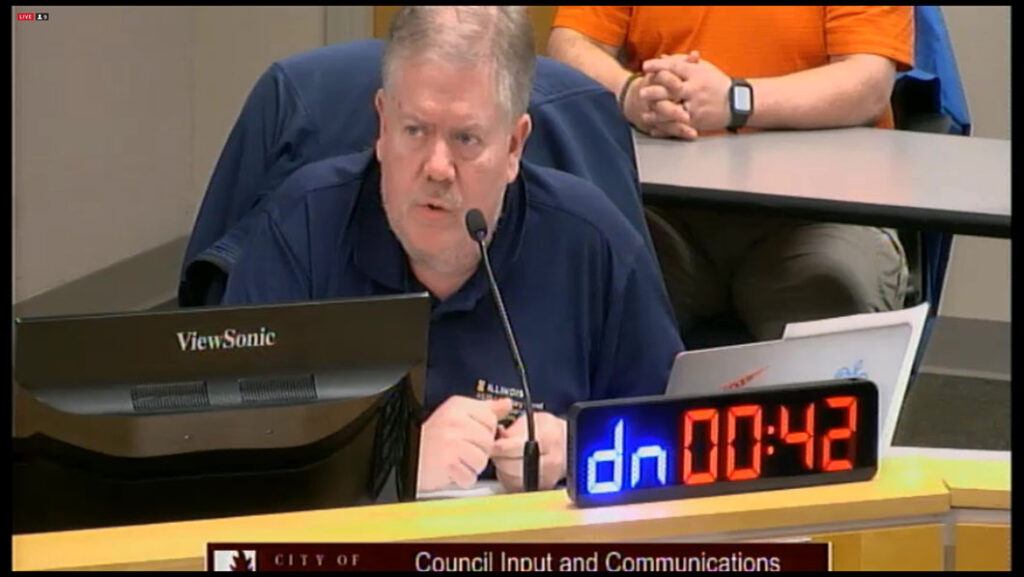
Since mid-2021, residents have been making requests to the Urbana, Illinois City Council to allow remote public input at their in-person meetings in the same way that it has been accommodated at their Zoom meetings.
On July 6th, 2021 Mayor Diane Marlin claimed that allowing remote public input for in-person meetings would be a violation of the Open Meetings Act (OMA). She said the City Attorney, David Wesner, also agreed that remote public input would violate the OMA.
Mayor Marlin, who has violated the OMA numerous times and paid to settle a related OMA lawsuit said, “we need to be very very careful to comply with the Open Meetings Act”.
At the most recent City Council meeting on April 4th, 2022, Urbana resident Tracy Chong raised the issue again, stating that there was no OMA provision that would prevent remote public input, and that the Mayor was never able to cite any such provision. Ms. Chong asked Mayor Marlin and David Wesner to explain their reasoning behind their ban on remote public participation.
Marlin and Wesner ignored Ms. Chong’s plea, but Council members James Quisenberry and Shirese Hursey issued comment later in the meeting.
Quisenberry said he’d spent a lot of time looking at the Open Meetings Act, and he claimed that allowing remote public input would likely be a violation because, “you don’t have the ability to create a capability that was not anticipated when the Act was designed.” Quisenberry said that residents commenting on remote public input are “speaking without legal knowledge” and that “it is not clear what the legislature’s intent was.”
Hursey said that she wanted to “piggyback” on Quisenberry’s assessment, saying that “the way we’ve been doing City Council meetings has been definitely approved by OMA, and nothing else after that. Just because they’re nothing saying that you can’t do it doesn’t mean that you can do it.”
Hursey noted that “people can still send emails, people can still send somebody to read for them, and there’s nothing stopping that kind of input.” Hursey was making reference to the provision in the City Council meeting agendas that allows residents to send public input via email by writing the words “PUBLIC INPUT” in the subject line.
Check CU provides the following analysis:
Quisenberry: “It is not clear what the legislature’s intent was.”
This is false. The legislature’s intent is written in Section 1 of the Open Meetings Act:
“It is the public policy of this State that public bodies exist to aid in the conduct of the people’s business and that the people have a right to be informed as to the conduct of their business. In order that the people shall be informed, the General Assembly finds and declares that it is the intent of this Act to ensure that the actions of public bodies be taken openly and that their deliberations be conducted openly.
The General Assembly further declares it to be the public policy of this State that its citizens shall be given advance notice of and the right to attend all meetings at which any business of a public body is discussed or acted upon in any way. Exceptions to the public’s right to attend exist only in those limited circumstances where the General Assembly has specifically determined that the public interest would be clearly endangered or the personal privacy or guaranteed rights of individuals would be clearly in danger of unwarranted invasion.
To implement this policy, the General Assembly declares:
(1) it is the intent of this Act to protect the citizen’s right to know; and
(2) the provisions for exceptions to the open meeting requirements shall be strictly construed against closed meetings.”
Quisenberry: “You don’t have the ability to create a capability that was not anticipated when the Act was designed.”
On the contrary, the Open Meetings Act obliges public bodies to create capabilities for public input. Section 2.06(g) of the OMA states that “Any person shall be permitted an opportunity to address public officials under the rules established and recorded by the public body.” The OMA does not mention podiums, microphones, loudspeakers, time limits, Zoom, email, sign language, spoken word, hand gestures, slide shows, visual aids, requests for speakers to state their name and place of residence, or any other thing about public input aside from the one sentence in 2.06(g). Every single mechanism and provision for public input ever used by a public body in Illinois represents, as Quisenberry put it, an act to “create a capability that was not anticipated”.
Hursey: “The way we’ve been doing City Council meetings has been definitely approved by OMA, and nothing else after that.”
This is false. The Attorney General does not approve of or scrutinize the public input methods of any public body unless a complaint is filed. The OMA does not mention or approve of email public input. Further, as already noted, the Urbana City Council has been cited for OMA violations by the Attorney General.
Hursey: “Just because there’s nothing saying that you can’t do it doesn’t mean that you can do it…people can still send emails, people can still send somebody to read for them, and there’s nothing stopping that kind of input.”
These statements are in conflict with each other and with Mr. Quisenberry’s prior assertion. There is no provision in the Open Meetings Act that says that a public body is allowed to accept public input via email. The Urbana City Council simply decided that they would, as Quisenberry put it, “create a capability”.
Quisenberry: Members of the public are “speaking without legal knowledge”.
This is an ad hominem – a tactic that individuals with weak arguments use to attempt to attack the credibility of the person with whom they disagree.
However, to satisfy Mr. Quisenberry’s unnecessary lust for authority, CheckCU inquired with the Illinois Attorney General. As expected, Assistant Attorney General Shannon Barnaby said, “it is up to the discretion of the public body whether or not to allow public input remotely when holding in-person meetings.” Lo and behold, this is exactly what Urbana residents have been trying to tell the Council for the past nine months.
—
Mayor Diane Marlin, James Quisenberry, and Shirese Hursey appear to have their priorities and concerns place in exact opposition to the plainly stated intent of the Open Meetings Act.
It is noteworthy that the Urbana Council enthusiastically enforced illegal speech restrictions upon the public during their meetings, but are now terribly concerned that they might somehow err toward too much open access for public input.
—
Shirese Hursey was appointed to the vacant Ward 3 seat by Mayor Marlin in 2019. James Quisenberry is a friend of Diane Marlin. The other five Council members as well as City Attorney David Wesner remained silent on the remote public input issue.
